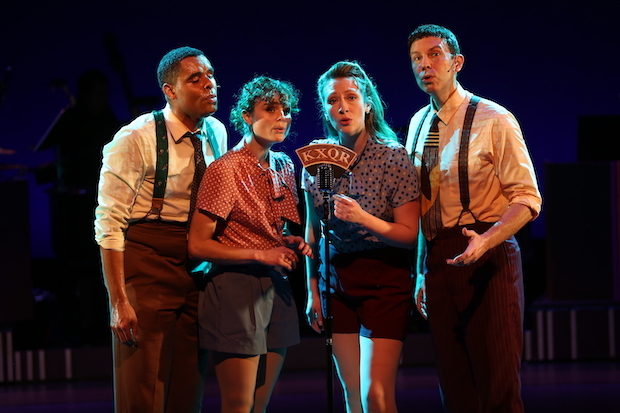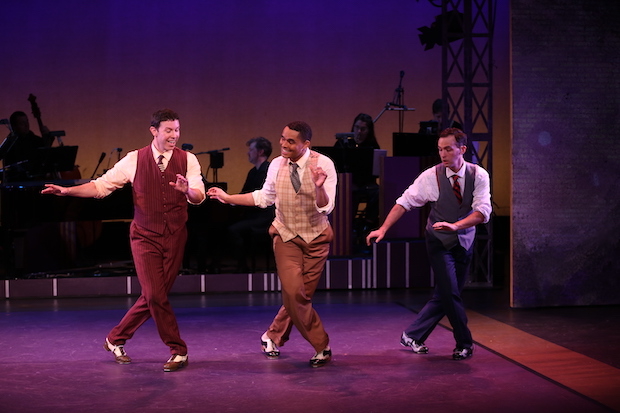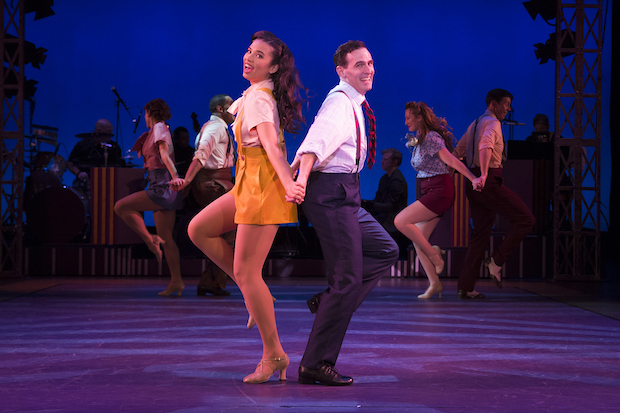Review: Cheek to Cheek: Irving Berlin in Hollywood Dances Us Back to the Movies
Randy Skinner’s new musical revue makes its world premiere at the York Theatre Company.

(© Carol Rosegg)
If Irving Berlin, America's preeminent songwriter for the first half of the 20th century, had one overarching mission, it was to craft a cohesive musical culture for a nation of immigrants. A transplant from the Russian Empire, Berlin wrote over 1,500 songs during his six-decade career, which started on Tin Pan Alley with songs like "Alexander's Ragtime Band" (1911), moved to Broadway where he wrote scores for the Ziegfeld Follies, and inevitably followed the public ear to Hollywood. That part of his career is the focus of Cheek to Cheek: Irving Berlin in Hollywood, the songful and sophisticated revue now making its world premiere with the York Theatre Company at the Theatre at St. Jean's (a new and far grander church basement for the little musical company, which was forced to vacate its home at St. Peter's earlier this year following a water main break).
Conceived, directed, and choreographed by Randy Skinner, the revue begins at the birth of the movie musical in 1927, when audiences accustomed to silence from their screen stars were serenaded by Al Jolson in The Jazz Singer. And what was he singing? Berlin's "Blue Skies."

(© Carol Rosegg)
Berlin was there from the very beginning, and book writer Barry Kleinbort painlessly takes us through the contract negotiations that brought about films like Follow the Fleet and Second Fiddle. Brief production histories lubricate the presentation of songs like "Let Yourself Go" and "I Poured My Heart Into a Song." A segment about Berlin's work habits (like Balzac, he wrote in the wee small hours) helps us to understand his unique mania (and frequent bouts of depression). And a fascinating glimpse into his notebook of unfulfilled ideas offers us a taste of his distinctively American sense of humor, like a potential St. Patrick's Day scene in which a couple of elderly buskers dance an Irish reel before conversing in Yiddish over their earnings. This is the essence of Irving Berlin's melting pot, a magical place where culture is appropriation and all is fair as long as you're earning a buck and having fun.
But, of course, if you don't want to think about any of that, Skinner and his gleamingly polished cast offer plenty of pure diversion: Victoria Byrd delivers a hauntingly beautiful rendition of "Reaching for the Moon," while Jeremy Benton and Kaitlyn Davidson channel Fred and Ginger in "Cheek to Cheek." Similarly, Phillip Attmore and Melanie Moore are positively charming in an overlapping medley of "I'm Putting All My Eggs in One Basket" and "Isn't This a Lovely Day?" And it's hard not to feel a little emotional during Byrd and Joseph Medeiros's sweet and simple duet of "Count Your Blessings."

(© Carol Rosegg)
Scenic designer James Morgan smartly leaves the stage open for Skinner's sweeping dances, while Brad Peterson's projections offer memory-jogging show posters and light atmosphere. Nicole Wee's costumes evoke a bygone era of Hollywood while providing maximum potential for movement, which is essential for a show like this.
As is to be expected from a show directed by Skinner (four-time Tony-nominated choreography), the dancing is the main event. Attmore and Benton set a high bar with the cane number "My Walking Stick." All three of the men prove to be excellent tappers in "Drum Crazy." And the whole company makes us believe the lyrics of the song, "The Best Things Happen While You're Dancing."

(© Carol Rosegg)
These hoofers don't just dance cheek to cheek, but "Back to Back." They do "The Piccolino" and "The Yam" — two dance crazes that Berlin helped spawn through the films Top Hat and Carefree. (Is there any more damning evidence of America's fraying culture than the fact that we haven't had a good dance craze since the "The Macarena"?)
Kleinbort's script occasionally obfuscates more than it reveals: World War II is not mentioned once (a remarkable omission in a musical about a notorious flag-waver); however, the Cold War is in a segment that contains the eyebrow-raising line, "His honest and unadorned lyrics speak to all strata of society and race." Songs like "Abraham"(unsurprisingly excluded here) certainly had something to say to Black Americans, but one doubts they were universally thrilled by it.

(© Carol Rosegg)
Despite its propagandistic flourishes, Cheek to Cheek is a fine tribute to America's most influential songwriter. Even if you don't know his name, you know Berlin's songs, and you probably start humming along when you hear them in the shopping mall. Only Stephen Foster rivals him in that regard, and Berlin had two important advantages over his predecessor: longevity (Foster died at 37, while Berlin lived to be 101) and the movies. Now that Americans are no longer consuming the same mass culture, can there ever again be a songwriter like that again? It will certainly take someone as gifted and prolific as Berlin to step up to the task of bringing a disunited states of America together in song. Here's looking at you, Taylor Swift.









